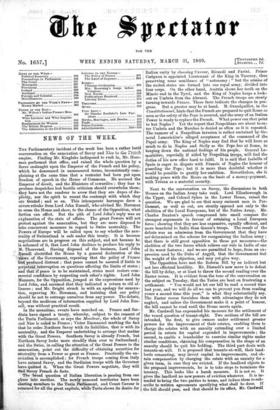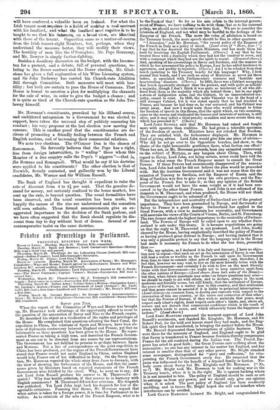The Opposition have met the Reform Bill by an indirect
but not less effectual hostility. Mr. Disraeli's new move is to defeat the bill by delay, or at least to throw the second reading over the Easter recess. It is evident from the tone of the conversation on the subject on Tuesday, that the Tories are bent on frustrating a settlement. "You would not let our bill be read a second time last year, and. we will do all we can to prevent you from reading yours a second time this year," is what they substantially say. The Easter recess furnishes them with advantages they do not neglect, and unless the Government make it a point of honour, the bill cannot be read untfl. the House meets again.
Mr. Cardwell has expounded his measure for the settlement of the vexed. question of tenant-right. Two sections of the bill are intended, the first, to give owners under settlement greater powers for the improvement of their estates, enabling them to charge the estates with an annuity extending over a limited period in return for capital expended in improvements ; the second, to enable a leaseholder to exercise similar rights under similar conditions, obtaining his compensation in the shape of an annuity should he quit his holding. The third part deals with tenants-at-will. It is proposed. that tenants-at-will, their land- lords consenting, may invest capital in improvements, and ob- tain compensation by charging the estate with an annuity for a given term in case they are evicted. If the landlord objects to the proposed improvements, he is to take steps to terminate the tenancy. This looks like a harsh measure. It is not so. It gives the landlord no new powers of eviction whatever. It is in- tended to bring the two parties to terms, and induce them to sub- scribe to written agreements specifying what shall be done. If the bill should pass, and that should be its effect, Mr. Cardwell will have conferred a valuable boon on Ireland. For what the Irish tenant moat requires is a habit of making a real contract with his landlord, and what the landlord most requires is to be taught to see that his interests, on a broad view, are identical with those of the tenant. Opposition came as a matter-of-course: from the Irish tenant-right Members, but, perhaps, when they understand the measure better, they will modify their views. The hostility of men like the O'Donoghue, Mr. Pope Hennessy, and Mr. Bowyer is simply faction-fighting. Besides a desultory discussion on the budget, with the Incarna- tes for a pretext, and a debate, full of personal questions, re- lating to the Dover contract and the Dover election, Mr. Glad- stone has given a fall explanation of his Wine Licensing system, and Sir John Trelawny has carried his Church-rate Abolition Bill through Committee. Both measures will meet with hos- tility; but both are certain to pass the House of Commons. That House is bound to sanction a plan for multiplying the channels for the sale of wine, in order to give the budget a chance ; and it is quite as tired of the Church-rate question as Sir John Tre- lawny himself.



























 Previous page
Previous page